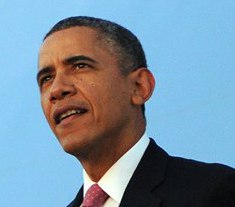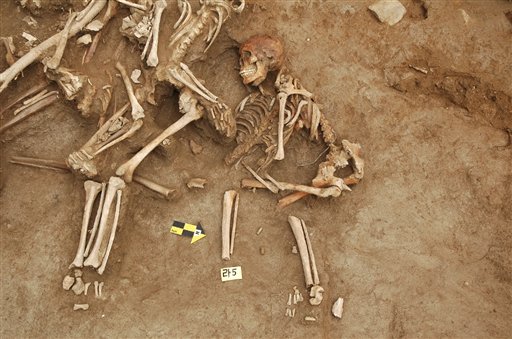(Via Lew Rockwell 2008-05-19: Cold War Murder and Roderick Long 2008-05-25: Anarchocide in South Korea.)
Charles J. Hanley, The Huffington Post (2008-05-18): Mass Killings In South Korea In 1950 Kept Hidden From History:
SEOUL, South Korea — One journalist’s bid to report mass murder in South Korea in 1950 was
blocked by his British publisher. Another correspondent was denounced as a possibly treasonous
fabricator when he did report it. In South Korea, down the generations, fear silenced those who
knew.
Fifty-eight years ago, at the outbreak of the Korean War, South Korean authorities secretively
executed, usually without legal process, tens of thousands of southern leftists and others rightly or
wrongly identified as sympathizers. Today a government Truth and Reconciliation Commission is
working to dig up the facts, and the remains of victims.
How could such a bloodbath have been hidden from history?
Among the Koreans who witnessed, took part in or lost family members to the mass killings, the
events were hardly hidden, but they became a public secret,
barely whispered about
through four decades of right-wing dictatorship here.
The family couldn’t talk about it, or we’d be stigmatized as leftists,
said Kim Chong-hyun,
70, leader of an organization of families seeking redress for their loved ones’ deaths in 1950.
Kim, whose father was shot and buried in a mass grave outside the central city of Daejeon, noted
that in 1960-61, a one-year democratic interlude in South Korea, family groups began investigating
wartime atrocities. But a military coup closed that window, and the leaders of those
organizations were arrested and punished.
Then, from 1961 to 1988, nobody could challenge the regime, to try again to reveal these
hidden truths,
said Park Myung-lim of Seoul’s Yonsei University, a leading Korean War historian.
As a doctoral student in the late 1980s, when South Korea was moving toward democracy, Park
was among the few scholars to begin researching the mass killings. He was regularly harassed by
the police.
Scattered reports of the killings did emerge in 1950 — and some did not.
British journalist James Cameron wrote about mass prisoner shootings in the South Korean port city
of Busan — then spelled Pusan — for London’s Picture Post magazine in the fall of 1950, but
publisher Edward Hulton ordered the story removed at the last minute.
Earlier, correspondent Alan Winnington reported on the shooting of thousands of prisoners at
Daejeon in the British communist newspaper The Daily Worker, only to
have his reporting denounced by the U.S. Embassy in London as an atrocity fabrication.
The British Cabinet then briefly considered laying treason charges against Winnington, historian
Jon Halliday has written.
Associated Press correspondent O.H.P. King reported on the shooting of 60 political prisoners in
Suwon, south of Seoul, and wrote in a later memoir he was shocked that American officers were
unconcerned
by questions he raised about due process for the detainees.
Some U.S. officers — and U.S. diplomats — were among others who reported on the killings. But
their classified reports were kept secret for decades.
— Charles J. Hanley, The Huffington Post (2008-05-18): Mass Killings In South Korea In 1950 Kept Hidden From History
William Gillis, Human Iterations (2008-05-22): Mass Graves:
The commission estimates at least 100,000 people were executed, in a South Korean population of 20 million. That estimate is based on projections from local surveys and is very conservative,
said Kim. The true toll may be twice that or more, he told The Associated Press.
In 1945, as the Japanese Empire finally went into retreat, the Korean people were left without an occupational authority for the first time in decades. In that brief moment something amazing happened. The Korean Anarchists, long the champions of the resistance struggle, came out of the woodwork and formed a nationwide federation of village and workers councils to oversee a massive project of land reform. Korea graduated from feudalism overnight. Aside from some struggles with the Socialists and Nationalists, the peninsula was at peace.
When WWII concluded, however, the responsibility
of securing peace and order in Korea was assigned to the Americans and Soviets. By all accounts in this instance the US actually had no imperialist intentions. While the Soviets moved quickly to deploy their forces and occupy the North, the Americans took their time showing up, and were largely content to let the South Koreans manage themselves.
The Koreans, culturally steeped with anti-authoritarian values, were fond of America and openly despised the Soviets. While a few socialists fled North hoping that the Soviets would give them a hand against the Anarchists, they were overwhelmed in numbers by a mass migration south. Everyone assumed the Americans would assist or at least respect their autonomy.
This did not last.
The Americans Military commanders who eventually arrived had trouble understanding or dealing with the anarchy they found. They had no protocol for dealing with regional federations and autonomous communes. So they helped the dispossessed aristocracy form a military government. In order to make the map simple.
In order to get things under hand.
Most importantly they did not understand that the Korean Anarchists and Anti-Authoritarian activists that saturated the countryside were different than–and in fact vehemently opposed to–the Communists, going so far as to organized and launch insurrectionary attacks on the Soviet Occupation before the Americans arrived.
The Americans couldn’t understand anarchists
. But leftists
, they knew, meant Soviets. And they had the gall to ignore or resist their puppet military government. So they started killing them.
By the start of the Korean War, the slaughter was in full swing. Having arrested every anarchist organizer or sympathetic peasant they could get their hands on, they started executing them en masse.
The Korean Anarchist movement was, historically, one of the strongest in the world. It survived half a century of brutal occupation and economic exploitation. It survived a three way assault by the Chinese, Japanese and Soviets. It has survived many, many massacres and exterminations. It is even still around today. So strong that in the last few years they’ve been known to evict the police from the streets. But the worst injury it ever suffered was initiated and orchestrated by the United States military. In a single campaign so horrific it borders on genocide.
This was truly, objectively, one of the worst things the US has ever done. And there are some big fucking contenders.
Most north american papers ran front-page stories this Monday about the latest mass graves being uncovered while I was riding the Empire Builder
from St. Paul to Portland. I found a copy wedged between Amtrak seat cushions. And there was an ancient photo of piled corpses as far as the eye could see. The papers euphemistically used the term leftists.
But I know the history, I did the research.
They were almost all anarchists.
However lovely America may be. Remember, the US government is not our friend. It will never be. It can never be.
— William Gillis, Human Iterations (2008-05-22): Mass Graves

